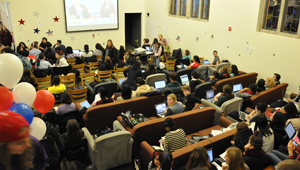Wellesley Students Talk Politics, Canvassing, for the 2014 Midterm Election

Historically, significantly fewer Americans vote in midterm elections than in presidential elections. Which might lead you to believe that midterm elections are not much to be excited about. But this year, a high-powered microscope is hyper-focused on a single segment of the population that may decide the entire election: women.
Whether it’s Elizabeth Warren (D-MA) campaigning for Senate candidate Natalie Tennant in West Virginia, or Ann Wagner (R-MO) fighting to win seats for more Republican women from states across the nation in the House of Representatives, women voters and female representation are certainly on the brain of a wide variety of politicians seeking election. According to a new poll released in a recent Time magazine article, the 2014 midterm election’s outcome depends on which side can capture the votes of the most women.
States author Jay Newton-Small, “Voters such as women and minorities, who often turn out in smaller numbers during off-year elections, are more motivated to vote when they feel women’s access to birth control and abortion are threatened, and if women and families’ economic security is imperiled.”
With issues of equal pay, as well as access to reproductive healthcare and abortion, on the table, female voters certainly have cause for activation during the 2014 election season.
Amidst nationwide conversations on gender, race and equality, Wellesley students are gearing up for the final push of the midterm election season. Senior political science major and Worcester, Mass., native Zoe Magid ’15 has been working on political campaigns since her junior year of high school, citing popular television program The West Wing as her inspiration. Says Magid, “I've worked on campaigns for the last six years, and between regularly scheduled federal elections, statewide elections, municipal and special elections, I've worked or volunteered on a total of nine campaigns. This year, I helped out on State Rep. Dan Donahue's primary campaign, and am currently volunteering for the Massachusetts Democratic Coordinated Campaign.”
Magid continues,
I don't think there's any one reason I can point to for continuing to work on campaigns. It's very fast paced and unpredictable, which I like. I also really enjoy both the people I work with, and the candidates I work for, so there's almost a social aspect to it as well. And of course, I feel very passionately about electing candidates who will work for a progressive agenda, so there's also a piece of it that's based on the values that I want my community to be governed by.
According to Wellesley College Republicans President Reba Meserve '16, Republicans on campus are also an active force in political organizing both on campus and back home. Says Meserve, “Many of our members are involved with campaigns in their home states, as well as campaigns going on here in Massachusetts. As an organization we participate in phone banking and door knocking for Republican candidates in Massachusetts. We all vote absentee to be sure that we still are involved with our home state elections.”
Despite out-of-state Wellesley students’ ability to register to vote in Massachusetts, many students choose to register in their home state. Says Wellesley College Democrats President Hadley Chase '15 on accommodating out-of-state students, “[The Wellesley College Democrats] help connect interested students with summer internships on campaigns in their states, which is generally easy because there are so many Wellesley alums working in politics across the country who are always willing to help students find campaign work.”
Continued Chase, “Also, Hubdialer (a new phone banking system that allows volunteers to make calls through their computers) enables us to make calls anywhere in the country. I remember during the 2012 Presidential election, we made calls for Obama for about ten hours because whenever it got too late to call one time zone, we moved to the next most western time zone and kept going.”
Hubdialer isn’t the only political software students are using on campus. This year, for the first time ever, Wellesley students were able to utilize TurboVote, an online service that allows students to register to vote and apply for absentee ballots online. The Committee for Political and Legislative Awareness (CPLA), a subset of College Government, organized a voter registration and absentee ballot drive in September. According to CPLA Chair Beth Feldstein ‘15, 59 students utilized the in-person drive to access voting resources, whereas 75 people signed up using TurboVote.
Beth’s work with elections on campus is far from done. On November 4, CPLA, along with the Wellesley College Republicans, the Wellesley College Democrats, the Knapp Social Science Center, the Wilson Fund and the Schneider Board of Governors (SBOG) are hosting an election night party. Beginning at 7pm in the Knapp Atrium, the celebration will bring together students from a wide variety of political backgrounds. Students can congregate in either partisan or bipartisan areas to watch election results come in.
Says Feldstein, “The Atrium is going to be a bipartisan space; the Democrats and Republicans are helping us set up our partisan spaces, where people should feel more free to cheer or express despair depending on the outcome of a given race.”
-Katelyn Campell '17
